Introduction to Federal Criminal Background Check
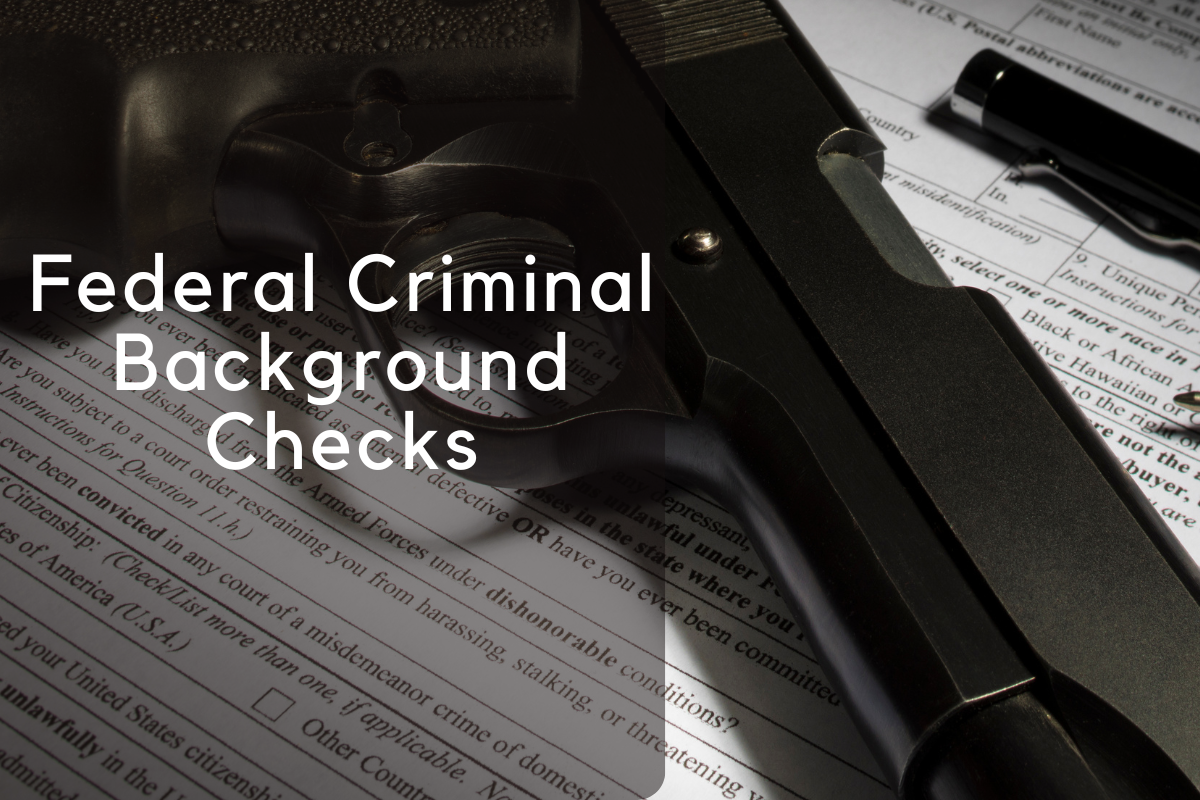
What is a Federal Criminal Background Check?
A federal criminal background check is a comprehensive review of an individual’s criminal history at the federal level. Unlike state or county background checks, which focus on offenses committed within a specific jurisdiction, a federal background check evaluates offenses that fall under federal law, such as crimes committed on federal property or violations of federal statutes.
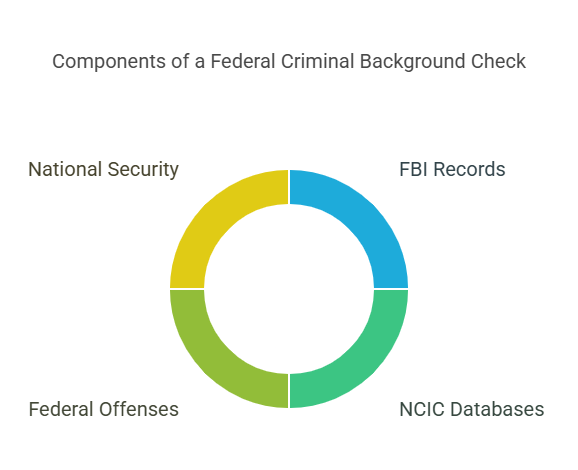
Federal background checks are essential for confirming an individual’s criminal history in cases that involve federal authorities, national security concerns, or other serious offenses that transcend state lines. These checks typically involve an investigation into national databases, including records from the Federal Bureau of Investigation (FBI) and the National Crime Information Center (NCIC).
Differences Between Federal and State/County Background Checks
State and county criminal background checks focus on offenses that occur within the boundaries of a specific state or county. They only provide information on crimes committed within that particular jurisdiction. On the other hand, a federal criminal background check looks for offenses that violate federal law, which often involves crimes such as tax evasion, drug trafficking, and immigration violations.
Why Federal Criminal Background Checks Are Important
Federal criminal background checks are a critical tool in several sectors, including:
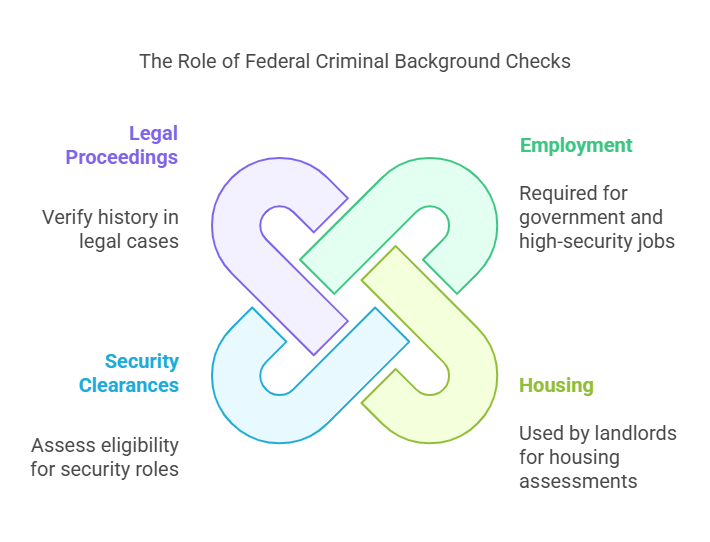
- Employment: They are often required for positions in government agencies, law enforcement, and high-security jobs.
- Housing: Landlords may use federal background checks to assess applicants for federal housing programs or public housing.
- Security Clearances: Individuals applying for security clearances may be subject to federal criminal background checks to assess their eligibility.
- Legal Proceedings: In certain legal situations, such as criminal trials or civil cases, a federal background check may be ordered to verify an individual’s history.
When is a Federal Criminal Background Check Required?
Federal criminal background checks are typically required in situations that involve federal jurisdiction or national security concerns. Examples of when a federal criminal background check is necessary include:
- Federal employment: Positions with federal agencies or contractors often require federal background checks to ensure the individual’s suitability for employment.
- Security clearance: For jobs that require access to classified information, a federal background check is essential to ensure the applicant’s trustworthiness.
- Legal proceedings: In cases involving federal law, a background check may be needed to gather relevant criminal history for sentencing or evidence purposes.
Types of Criminal Records in a Federal Background Check
Federal criminal background checks may reveal various types of criminal records, including:
- Felony convictions: Serious offenses that are prosecuted under federal law, such as drug trafficking, white-collar crimes, and organized crime.
- Federal charges: Any pending charges or arrests related to federal crimes.
- Federal court cases: Involvement in legal matters handled by federal courts, such as immigration violations or crimes committed on federal property.
The FBI’s NCIC database is the primary source of federal criminal records, containing detailed information on individuals with federal criminal convictions, arrests, and warrants.
How a Federal Criminal Background Check Works
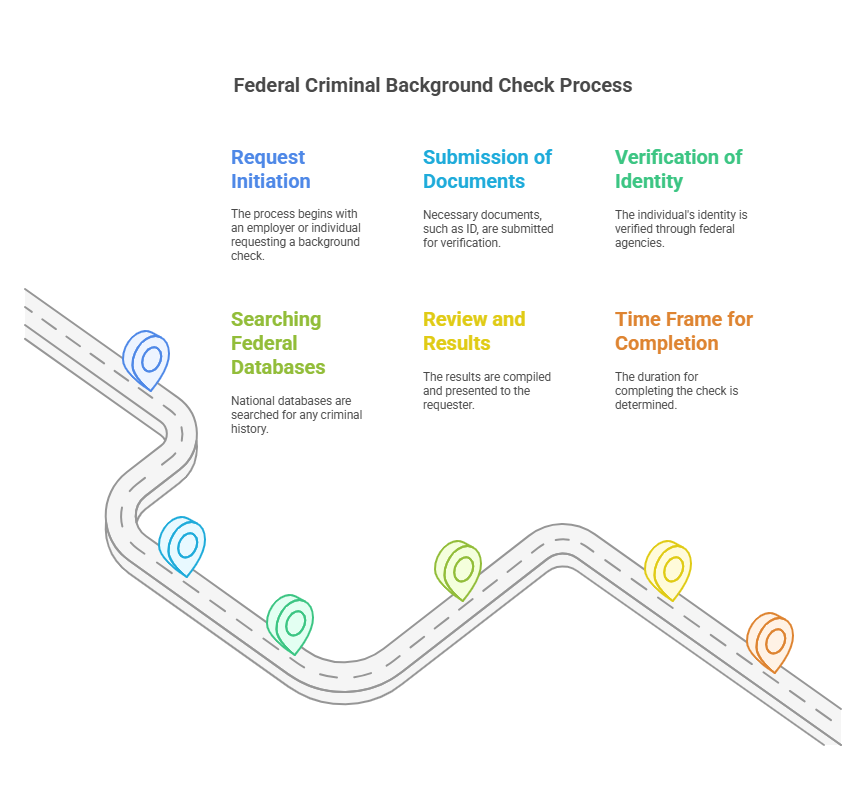
The Process of Conducting a Federal Criminal Background Check
The process of conducting a federal criminal background check typically involves a series of well-defined steps. These steps help ensure that the check is thorough, accurate, and complies with relevant laws. Below is a breakdown of how the process works:
- Request Initiation:
The first step in a federal criminal background check is initiating the request. This is typically done by the employer, landlord, or individual applying for a security clearance. To request a federal criminal background check, the applicant must provide identifying information, such as their full name, date of birth, and possibly fingerprints. Employers may use a third-party service provider to conduct the check on their behalf. - Submission of Documents:
In some cases, individuals may be asked to submit specific documents as part of the process. This can include proof of identity, such as a government-issued ID or a social security number. The documents are submitted electronically or manually, depending on the method chosen. - Verification of Identity:
Once the documents and application are submitted, the identity of the individual is verified. This is often done through the FBI’s National Crime Information Center (NCIC) or another federal agency. The verification ensures that the check is conducted for the correct person and that there are no discrepancies with their identity. - Searching Federal Databases:
The most critical part of a federal background check involves searching national databases for any criminal history. The FBI’s NCIC is one of the primary sources, containing records of arrests, convictions, warrants, and other information about crimes prosecuted under federal law. The check may also involve a review of other government records and databases for completeness. - Review and Results:
After searching the relevant databases, the results are compiled and presented to the requester. This report may include information about the individual’s criminal history, including any federal convictions, pending cases, and related criminal activities. Depending on the results, the requester may need to make further inquiries or decisions based on the information provided. - Time Frame for Completion:
The length of time it takes to complete a federal criminal background check can vary depending on factors such as the individual’s history, the volume of requests being processed, and the method of request (manual or online). Typically, a federal background check can take anywhere from a few days to a few weeks to complete.
Types of Documents and Information Needed for a Federal Criminal Background Check
The required documents and information may vary depending on the type of background check being performed. However, the most common documents and information required include:
- Full Name: This is the primary identifier to ensure the correct individual is being checked.
- Date of Birth: This helps to distinguish between individuals with similar names.
- Social Security Number (SSN): In some cases, a Social Security Number may be required to cross-check records across various databases.
- Fingerprints: For more comprehensive checks, such as those involving employment or security clearance, fingerprinting is often required.
Comparison of Federal Background Check vs. Other Background Checks
To understand the differences between federal and other types of background checks, it’s essential to compare their scope and methods. Below is a comparison table that highlights the main distinctions:
| Aspect | Federal Criminal Background Check | State/County Criminal Background Check | Local/City Criminal Background Check |
|---|---|---|---|
| Scope | Nationwide, federal crimes | Limited to state or county jurisdiction | Local to a city or county |
| Primary Source | FBI’s NCIC and federal databases | State or county court records | Local law enforcement agencies |
| Types of Crimes | Federal offenses (e.g., tax evasion, organized crime) | State-level crimes (e.g., assault, theft) | Local violations (e.g., minor infractions) |
| Processing Time | Can take several days to weeks | Typically faster, within a few days | Usually quicker than state or federal checks |
| Required Documents | Full name, date of birth, SSN, fingerprints (for certain checks) | Name, date of birth, location of offenses | Name, address, and possibly court records |
Results of a Federal Criminal Background Check
The results of a federal criminal background check can provide valuable insights into an individual’s history. The information typically reviewed includes:
- Criminal Convictions: Any federal convictions related to serious crimes.
- Pending Charges: Information about any active investigations or charges.
- Federal Court Cases: Data about ongoing or past federal legal cases, including the nature of the charges.
- Warrants and Arrests: Federal warrants or arrests linked to the individual.
These results are crucial for determining whether an individual is suitable for employment, housing, or other opportunities requiring a clean legal history.
Time Frame and Factors Affecting Federal Background Check Processing
While the processing time for a federal criminal background check can vary, it typically ranges from several days to a few weeks. Factors that influence processing time include:
- Volume of Requests: High demand can slow down the review process.
- Complexity of the Case: If the individual has a complex criminal history or multiple jurisdictions involved, it may take longer to process.
- Method of Request: Online checks tend to be faster than manual requests, though the accuracy of the data must be considered.
Rapid Hire Solutions and Federal Criminal Background Checks
Rapid Hire Solutions can play a crucial role in streamlining the federal criminal background check process. By leveraging advanced technology and expertise in screening services, they assist businesses and individuals in obtaining quick and reliable background checks. Whether for employment, housing, or security clearances, Rapid Hire Solutions ensures that clients receive accurate and timely results, making the verification process hassle-free and compliant with federal regulations.
Legal Aspects of Federal Criminal Background Checks
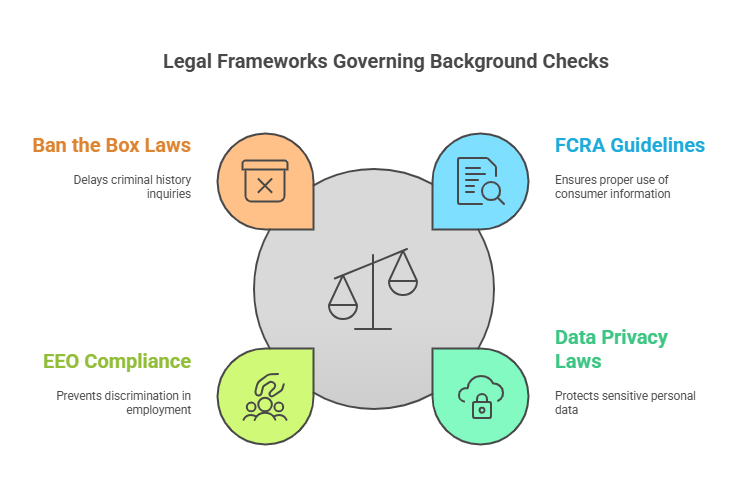
Federal criminal background checks are governed by a number of legal frameworks designed to ensure fairness, privacy, and compliance. It’s important for employers, landlords, and other entities requesting background checks to be aware of these laws to avoid legal repercussions.
1. Fair Credit Reporting Act (FCRA)
The Fair Credit Reporting Act (FCRA) plays a significant role in the legalities of background checks, including federal criminal checks. The FCRA sets the guidelines for the proper use of consumer information, including criminal history, by employers, landlords, and other entities. Under the FCRA, the following must be followed:
- Disclosure and Consent: Before conducting a background check, individuals must be informed and consent must be obtained, especially when it comes to employment-related checks.
- Accuracy: Information obtained from background checks must be accurate, up-to-date, and relevant to the purpose for which it is being used.
- Adverse Action Notice: If an employer decides not to hire someone based on information found in a criminal background check, they must notify the applicant in writing. This includes providing the applicant with the opportunity to dispute any incorrect information found.
2. Data Privacy and Security Laws
Federal criminal background checks may include sensitive personal data, including arrest records and conviction information. These checks must comply with privacy laws like the Privacy Act of 1974 and state-specific data protection laws that govern the handling of personal data.
- Employers must ensure that the information obtained from background checks is stored securely.
- Data should only be used for the purpose for which it was obtained and not shared improperly.
3. Equal Employment Opportunity (EEO) Compliance
Employers conducting federal criminal background checks must also comply with Equal Employment Opportunity Commission (EEOC) guidelines to ensure that they do not discriminate based on race, color, national origin, sex, disability, or religion. The EEOC has specific guidelines on when and how criminal background information can be used in employment decisions. For instance, employers are prohibited from using criminal history to automatically disqualify candidates from consideration unless it is directly related to the job position.
4. Ban the Box Laws
Some states and local jurisdictions have enacted “Ban the Box” laws, which prevent employers from asking about criminal history on job applications. These laws aim to give individuals with criminal records a fair chance at employment by evaluating their qualifications first, before considering their criminal history. These laws can apply to federal, state, and local government jobs, and even some private employers in certain regions. It’s essential to be aware of these laws when conducting background checks to ensure compliance.
FAQs About Federal Criminal Background Checks
What is the difference between a federal criminal background check and a state criminal background check?
A federal criminal background check reviews records for federal offenses, such as tax evasion, organized crime, and federal drug trafficking, which are prosecuted under federal law. A state criminal background check, on the other hand, focuses on state-level crimes such as theft, assault, and other violations within a specific state. A federal check covers nationwide crimes under federal jurisdiction, while a state check only covers crimes within that state.
How long does a federal criminal background check take to process?
The processing time for a federal criminal background check typically ranges from a few days to a few weeks. The duration depends on factors like the method of request (online or manual), the complexity of the individual's criminal history, and the volume of requests being processed at any given time. Online requests tend to be quicker, while manual checks may take longer due to additional verification steps.
Can a federal criminal background check reveal convictions from all 50 states?
Yes, a federal criminal background check can reveal convictions for federal crimes that may have occurred in any of the 50 states. However, it may not necessarily cover state-specific criminal records. For comprehensive criminal background checks, employers or organizations may need to conduct both federal and state checks.
What happens if a criminal record is found during a federal background check?
If a criminal record is found during a federal background check, the results will be presented to the requester, whether it’s an employer, a landlord, or another entity. The presence of a criminal record does not automatically disqualify someone; the relevance of the conviction to the role, the time elapsed since the offense, and other factors will be considered. For employers, the information may trigger a follow-up process, which could include a review of the applicant's qualifications, rehabilitation efforts, or discussions with the individual.
How do employers use federal criminal background checks in hiring decisions?
Employers use federal criminal background checks as part of their due diligence process in hiring candidates. They help ensure that applicants do not have a criminal history that could pose a risk to the company or the role they are applying for. Employers are required to follow the FCRA and EEOC guidelines when using criminal records in employment decisions. This means they must assess whether the offense is relevant to the job and whether the applicant has been rehabilitated.
Conclusion
A federal criminal background check is a critical tool for ensuring safety, trust, and compliance across multiple sectors, including employment, housing, and security. It plays an important role in verifying an individual’s history, especially in federal jobs or roles that involve high security or public trust. Understanding the process, legal aspects, and best practices surrounding federal background checks is essential for individuals and organizations to navigate the complexities involved.
Rapid Hire Solutions can assist businesses and individuals in conducting federal criminal background checks quickly and accurately. With their expert knowledge of the process and compliance with federal regulations, they provide a reliable and efficient service for background verification, ensuring that all legal and privacy concerns are addressed.
By following proper protocols and understanding the legal landscape, both employers and employees can ensure that federal criminal background checks are conducted in a fair, transparent, and legally compliant manner.
